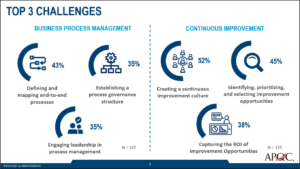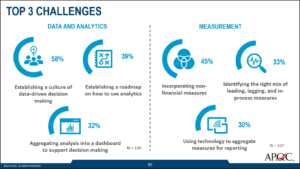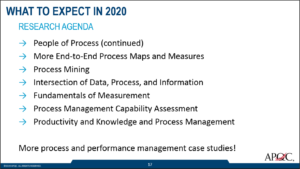I listened in on a webinar today with APQC‘s Holly Lyke-Ho-Gland looking at the results of their 2020 process and performance management priorities survey (conducted in late 2019). Some good insights here, looking at the top three challenges in business process management and continuous improvement. Process modeling and mining vendors will be happy to see that the highest priority challenge in BPM is defining and mapping end-to-end processes.
She covered a number of tips and solutions to address these challenges, from points on developing end-to-end processes, how to develop a culture of continuous improvement, and governance alignment. She included a lot of great case studies and examples across all of these areas, and what type of resources and expertise is required to achieve them.
After covering the business process management and continuous improvement side, she moved on to discuss the organizational performance management challenges and solutions. Performance management is more about analytics and metrics, and using those measures to support decision making; apparently this year’s challenges are the same as last year’s, meaning that organizations are still struggling with these issues.
Some interesting points here about change management plans and what needs to be done in order to be successful in performance management; check out the webinar replay for details.
The last part of the webinar was on their “special interest” section, which this year is process management. The first point was on the purpose of process teams and work, the most important of which is supporting strategic initiatives. This is definitely what I see in my own consulting practice, with process gaining a much higher profile as companies focus on digital transformation efforts: at their heart, many transformation efforts are process-centric. The APQC research also showed information on measuring process work, and she notes (as I often see) that the top measures are still focused on bottom-line savings rather than more strategic measures, meaning that process metrics are misaligned with strategic focus. She also covered the impact of technology on process work: not just process automation, but collaboration, data management and visualization, collaboration and cloud computing topped the technology list, since they are looking at the entire process management lifecycle. She made a direct call-out to process mining (although it wasn’t in the top five list) as a cross-over between data analysis and process modeling; I’m definitely in agreement with that as you can see from my post earlier this week.
She finished with a summary of the survey results, plus a peek at their research agenda for 2020 with lots of interesting and timely topics. I like that their research uses a lot of real-world case studies.
I couldn’t find a direct link to the webinar replay yet, but it will likely available on APQC’s On-Demand Webinars page soon; definitely worth checking out for Lyke-Ho-Gland’s insights and discussion. While you’re over there, check out their Process and Performance Management Conference, coming up in October. I spoke at their conference back in 2013, and really enjoyed the experience, good sessions and a smaller conference so great for networking.



